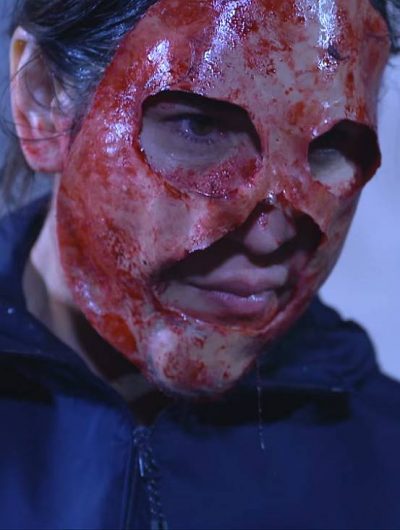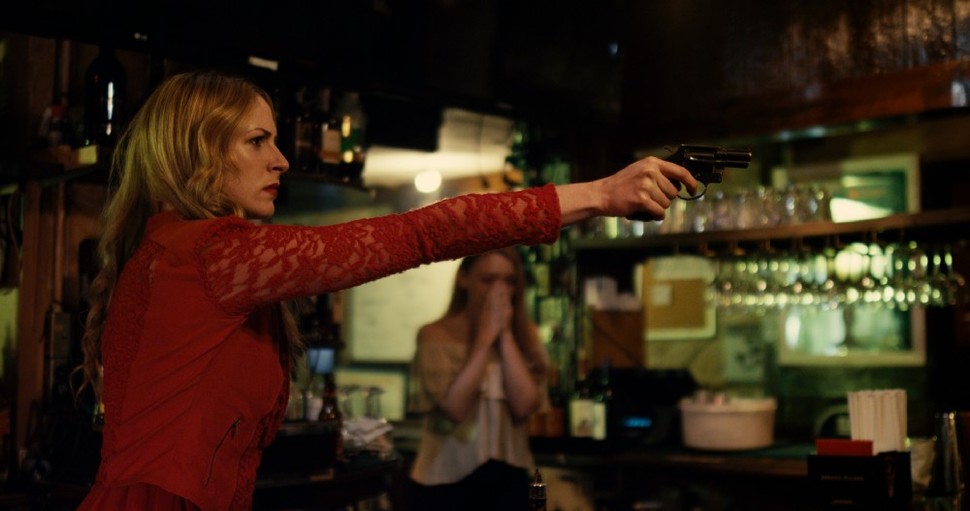★★★★
“The mother of all vengeance stories.”

 This is the first Thai TV series I’ve seen, and while I suspect it’s not exactly par for the course, I found it undeniably impressive. Behind a generic title, it’s easily the most intense of the telenovelas I’ve seen, regardless of location. [Note: various sources have different names for the characters: for consistency, I’m giving the ones used by Netflix] It’s a long, extended rampage of vengeance, in which the heroine, Maturos (Panyopas), goes after the perpetrators of a particularly vicious group-rape. The assailants are a local gang, who extract revenge on both Maturos and her daughter, Peung (Ruayruen), following their co-operation with the police. It’s an assault which leaves Matukron almost catatonic, and when half the gang are found not guilty in the subsequent trial, Maturos opts to find her own justice, adopting a variety of characters to get close to them. But the killing comes at the cost of her own sanity, which splits her personality into two: a caring and compassionate half, and an alternative persona which demands ever-more savage vengeance.
This is the first Thai TV series I’ve seen, and while I suspect it’s not exactly par for the course, I found it undeniably impressive. Behind a generic title, it’s easily the most intense of the telenovelas I’ve seen, regardless of location. [Note: various sources have different names for the characters: for consistency, I’m giving the ones used by Netflix] It’s a long, extended rampage of vengeance, in which the heroine, Maturos (Panyopas), goes after the perpetrators of a particularly vicious group-rape. The assailants are a local gang, who extract revenge on both Maturos and her daughter, Peung (Ruayruen), following their co-operation with the police. It’s an assault which leaves Matukron almost catatonic, and when half the gang are found not guilty in the subsequent trial, Maturos opts to find her own justice, adopting a variety of characters to get close to them. But the killing comes at the cost of her own sanity, which splits her personality into two: a caring and compassionate half, and an alternative persona which demands ever-more savage vengeance.
 The story is told in the context of Maturos’s trial, so we know there’s no question of her getting away with it [that would probably have been a step too far!]. But will she get the death penalty, life imprisonment, or be found not guilty by reason of insanity? The show unfolds in flashback, occasionally interrupted with moments from the trial, telling the story of how she came to be facing multiple charges of murder. It begins with mother and daughter leaving their abusive husband and father. It’s the resulting precarious financial situation, moving them into a flat in a less than desirable neighbourhood, and bringing them into contact with the gang. They accidentally come into possession of a drug stash belonging to the posse, and hand it over to the authorities.
The story is told in the context of Maturos’s trial, so we know there’s no question of her getting away with it [that would probably have been a step too far!]. But will she get the death penalty, life imprisonment, or be found not guilty by reason of insanity? The show unfolds in flashback, occasionally interrupted with moments from the trial, telling the story of how she came to be facing multiple charges of murder. It begins with mother and daughter leaving their abusive husband and father. It’s the resulting precarious financial situation, moving them into a flat in a less than desirable neighbourhood, and bringing them into contact with the gang. They accidentally come into possession of a drug stash belonging to the posse, and hand it over to the authorities.
This triggers the brutal punishment on them both, on top of a building during a storm. It’s a lengthy ordeal, which occupies much of episode #4, with Maturos and Peung left lying on the roof. Though the police are able to arrest the suspects, the rain washes away much useful forensic evidence; only three of the seven are convicted, despite the best efforts of Inspector Patorn (Tangtong). He feels responsible for what happened, and had been somewhat involved in a relationship with Maturos before the attack. Afterward, however, that quickly proves to be impossible.
Indeed, it’s not long before Maturos’s alter ego, Roong, starts to show up. At first, she is subservient, appearing only in mirrors, but gradually becomes to dominate, taking control for much of the time. Not helping matters – though it is one of the most interesting angles – is the encouragement of Yuki Fukushida (Amratisha), who rescues Maturos from an abduction attempt by her ex-husband. Yuki runs a “victim’s support group”, for those abandoned by justice. It’s really more to do with helping them acquire the necessary set of skills to punish those who did them wrong. Needless to say, her encouragement doesn’t do much for our heroine’s sanity, instead letting her tap into her inner psychopath. The ex-husband is the first to experience that.
For the four unconvicted perpetrators, the pattern in the following episodes is similar. As shown on the poster (above, right), Maturos adopts a range of disguises – old woman, porn distributor, bar girl, human trafficker, or even a man – in order to get close to them. Having done so, eventually, she strikes, rendering them helpless, most typically with a sedative injection. She makes them record an apology to Peung, before finally dispatching them – albeit only after removing their genitals. Their deaths are never quick or easy, and are depicted at quite some length, as well as with a brutality which I found surprising. Thai TV may have severe limitations on sexual content, but violence is clearly seen as much less of a problem.
As  the body count increases, the remaining gang members grow increasingly suspicious, and harder to track. Inspector Patorn is also beginning to put two and two together, and Maturos’s psychiatrist, Dr. Nattha, discovers her patient’s split personality, meeting Roong. Even after Patorn realizes her involvement in the murders, he agrees to let her act as bait to lure in the three remaining gang members, who have escaped from prison and, having reached the same conclusion, are coming for their own revenge.
the body count increases, the remaining gang members grow increasingly suspicious, and harder to track. Inspector Patorn is also beginning to put two and two together, and Maturos’s psychiatrist, Dr. Nattha, discovers her patient’s split personality, meeting Roong. Even after Patorn realizes her involvement in the murders, he agrees to let her act as bait to lure in the three remaining gang members, who have escaped from prison and, having reached the same conclusion, are coming for their own revenge.
But Maturos is playing a longer game, and it all builds to a final confrontation on the same rooftop where it began. As the image on the left suggests, she ends up going full Silence of the Lambs, wearing the face of one of her targets as a mask, and her final “disguise”. Though we still have to wait for the court’s verdict on her fate, with the case triggering a national debate regarding the death penalty, in addition to the question of Maturos’s culpability.
As on screen, so in real life, with the series proving a word of mouth hit in Thailand, and sparking similar discussions on the criminal justice system. The show’s ratings improved from as low as 1.3 in the early going, partly due to a late-night slot resulting from its content, reaching 3.7 for the finale. Deservedly so, because it was very effective: a real page-turner in televisual form. It certainly doesn’t pull any punches, and seems to be radically different from the typical “lakorn”, as the popular soap operas in Thailand are known. Though a 2014 study discovered that 80% of them depicted rape or sexual violence, I suspect few did so in such an uncompromising way as here.
It may, indeed, perhaps go too far occasionally. Chris largely lost her sympathy for Maturos, after watching her bring Peung along on one of her murders – even I have to admit, that is fairly questionable parenting, split personality or not. And watching the heroine don blackface in her prostitute character was perhaps something which didn’t transfer well, culturally. However, given the length of the series (24 x 50-minute episodes), such mis-steps are infrequent, and more than balanced out by a great performance from Panyopas. That’s especially so when she’s acting opposite her malevolent self, in a way which feels almost like a maternal version of Gollum.
It’s her portrayal which glues the series together; outside of sensei Yuki, the supporting cast of characters feel more functional than memorable, on both sides of the law. How successful you find the show as a whole is thus likely heavily dependent on how convincing you find her performance. Personally, I was more than satisfied with it, and while this may be optimistic, hope to find similar quality elsewhere in the lakorn genre.
Dir: Sant Srikaewlaw
Star: Lalita Panyopas, Pornsroung Ruayruen, Saksit Tangtong, Rudklao Amratisha
a.k.a. Lah (The Hunt)






 First, the good news. Whatever the issue was with
First, the good news. Whatever the issue was with 
 This is the first Thai TV series I’ve seen, and while I suspect it’s not exactly par for the course, I found it undeniably impressive. Behind a generic title, it’s easily the most intense of the telenovelas I’ve seen, regardless of location. [Note: various sources have different names for the characters: for consistency, I’m giving the ones used by Netflix] It’s a long, extended rampage of vengeance, in which the heroine, Maturos (
This is the first Thai TV series I’ve seen, and while I suspect it’s not exactly par for the course, I found it undeniably impressive. Behind a generic title, it’s easily the most intense of the telenovelas I’ve seen, regardless of location. [Note: various sources have different names for the characters: for consistency, I’m giving the ones used by Netflix] It’s a long, extended rampage of vengeance, in which the heroine, Maturos ( The story is told in the context of Maturos’s trial, so we know there’s no question of her getting away with it [that would probably have been a step too far!]. But will she get the death penalty, life imprisonment, or be found not guilty by reason of insanity? The show unfolds in flashback, occasionally interrupted with moments from the trial, telling the story of how she came to be facing multiple charges of murder. It begins with mother and daughter leaving their abusive husband and father. It’s the resulting precarious financial situation, moving them into a flat in a less than desirable neighbourhood, and bringing them into contact with the gang. They accidentally come into possession of a drug stash belonging to the posse, and hand it over to the authorities.
The story is told in the context of Maturos’s trial, so we know there’s no question of her getting away with it [that would probably have been a step too far!]. But will she get the death penalty, life imprisonment, or be found not guilty by reason of insanity? The show unfolds in flashback, occasionally interrupted with moments from the trial, telling the story of how she came to be facing multiple charges of murder. It begins with mother and daughter leaving their abusive husband and father. It’s the resulting precarious financial situation, moving them into a flat in a less than desirable neighbourhood, and bringing them into contact with the gang. They accidentally come into possession of a drug stash belonging to the posse, and hand it over to the authorities. the body count increases, the remaining gang members grow increasingly suspicious, and harder to track. Inspector Patorn is also beginning to put two and two together, and Maturos’s psychiatrist, Dr. Nattha, discovers her patient’s split personality, meeting Roong. Even after Patorn realizes her involvement in the murders, he agrees to let her act as bait to lure in the three remaining gang members, who have escaped from prison and, having reached the same conclusion, are coming for their own revenge.
the body count increases, the remaining gang members grow increasingly suspicious, and harder to track. Inspector Patorn is also beginning to put two and two together, and Maturos’s psychiatrist, Dr. Nattha, discovers her patient’s split personality, meeting Roong. Even after Patorn realizes her involvement in the murders, he agrees to let her act as bait to lure in the three remaining gang members, who have escaped from prison and, having reached the same conclusion, are coming for their own revenge.